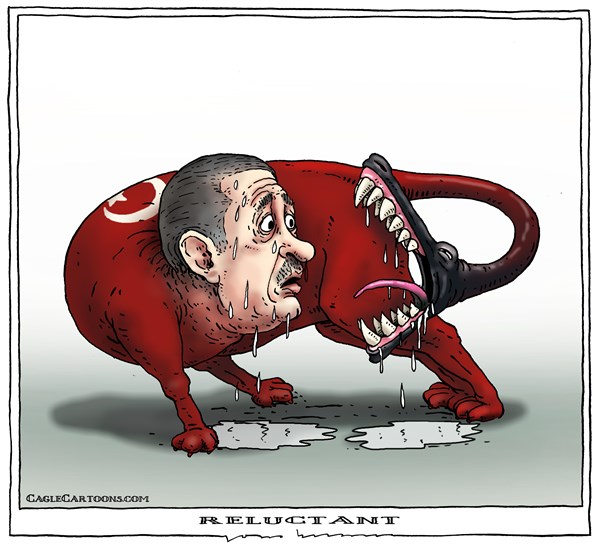
Muhammad Hamzah Khan, 19, planned to fly to Turkey, then cross the border into Syria to join the terrorists of the Islamic State. But the FBI arrested him at O’Hare airport in Chicago Oct. 4.
Ankara “allowed its Syria border to become a two-way ‘jihadist highway,’ ” said Turkish journalist Kadri Gursel. Most of up to 12,000 foreign fighters got to the Islamic State via Turkey, where wounded jihadis have received free medical care.
“Turkey’s support was vital for the jihadists in getting in and out of the country,” wrote Orhan Kemal Cengiz in the newspaper Zaman.
“Turkey paved the way for us,” an Islamic State fighter, in Ankara for medical treatment, told the newspaper Aydinlik.
The Turks “provided the bulk of ISIS’ funds, logistics, training and arms,” said Middle East expert Daniel Pipes.
Turkey supported Jabhat al-Nusra (the al-Qaida affiliate President Barack Obama called “the Khorasan Group”), said Francis Ricciardone, our ambassador there until June.
By “Ankara,” “Turkey” and “the Turks,” they mean the Islamist government of Recep Erdogan, prime minister since 2003, president since July, whose policies are as controversial within Turkey as are Mr. Obama’s in ours.
At Mr. Erdogan’s urging, the Turkish parliament voted Oct. 2 to join the coalition against the Islamic State. Is he willing now to fight terrorists he backed? His words say one thing, his actions another. The half battalion of Turkish tanks watching genocide unfold in Kobane screams.
“A terrible slaughter is coming,” Rooz Bahjat, a Kurdish intelligence official, told Jeffrey Goldberg of The Atlantic. “If they take the city, we should expect to have 5,000 dead within 24 or 36 hours.”
Once a town of 400,000 on the Syrian side of the border, Kobane will fall because the Islamic State has tanks and artillery; its defenders have no heavy weapons.
Though the most powerful terror group ever, the Islamic State is no match for the Turks. The Islamic State has a few dozen tanks. Turkey has 3,657. If President Erdogan had given the order, Turkey’s military could have lifted the siege of Kobane in hours.
He didn’t. Turkish troops prevented Kurds in Turkey from helping their brethren.
Why did Mr. Erdogan back Islamic State and al-Qaida terrorists? All seek a worldwide “caliphate” ruled by Islamic law. Mr. Erdogan hates Syrian dictator Bashar Assad — for religious reasons (Assad belongs to a Shia sect that Salafis consider heretics), for geopolitical reasons and because he has brutally suppressed the Muslim Brotherhood, which Mr. Erdogan supports.
Why does he now at least pretend to fight them?
When civil war broke out in 2011, Mr. Erdogan aided the Islamic State and al-Qaida because he expected Assad to fall, said Jonathan Schanzer, who analyzed terrorist finances for the Treasury Department. When Assad didn’t, Mr. Erdogan “doubled down; let in nastier and nastier guys.”
“This wasn’t a policy by design,” Mr. Schanzer said. “It was a policy of errors.”
The Islamic State is “Turkey’s own Frankenstein monster,” said Turkish journalist Burak Bekdil. When the Islamic State grew beyond his ability to manipulate it, Mr. Erdogan’s political calculus changed. And because Turkey isn’t yet an Islamic dictatorship, Mr. Erdogan must pay heed to public opinion. But don’t expect him to contribute more than lip service, Mr. Bekdil said.
Most in what he calls the “coalition of the unwilling” do just enough to keep up appearances, said Fadi Hakura, an analyst for a London think tank.
Our initial air strike in Syria was designed to hold down terrorist casualties, noted retired Army intelligence officer Ralph Peters. More serious strikes in the last few days have delayed the inevitable in Kobane, but aren’t enough to save the city. The Kurds might have held off the Islamic State if they had TOW and AT-4 anti-tank missiles, but Mr. Obama didn’t supply them.
“Why did the U.S. help the Kurds in Iraq but leave ISIS to massacre them in Syria?” asked The Guardian, a left-wing British newspaper.
That’s a good question. Why aren’t our journalists asking it?
Comment by clicking here.
JWR contributor Jack Kelly, a former Marine and Green Beret, was a deputy assistant secretary of the Air Force in the Reagan administration.



 Contact The Editor
Contact The Editor
 Articles By This Author
Articles By This Author